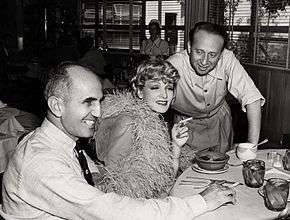George Marshall (director)
| George Marshall | |
|---|---|
 | |
| Born |
December 29, 1891 Chicago, Illinois, United States |
| Died |
February 17, 1975 (aged 83) Los Angeles, California, United States |
| Other names | George E. Marshall |
| Occupation | Actor, screenwriter, producer, film and television director |
| Years active | 1915–1975 |

George E. Marshall (December 29, 1891 – February 17, 1975) was an American actor, screenwriter, producer, film and television director, active through the first six decades of movie history.
Relatively few of Marshall's films are well-known today, with Destry Rides Again, The Sheepman, and How the West Was Won being the biggest exceptions. Marshall co-directed How the West Was Won with John Ford and Henry Hathaway, handling the railroad segment, which featured a celebrated buffalo stampede sequence. While Marshall worked on almost all kinds of films imaginable, he started his career in the early silent period doing mostly Westerns, a genre he never completely abandoned. Later in his career, he was particularly sought after for comedies. He did around half a dozen films each with Bob Hope and Jerry Lewis, and also worked with W.C. Fields, Jackie Gleason, Will Rogers, and Laurel and Hardy.
Lucille Ball chose George Marshall to direct eleven episodes of her "Here's Lucy" television series in 1969.
For his contribution to the film industry, George Marshall has a star on the Hollywood Walk of Fame at 7048 Hollywood Boulevard.
Partial filmography
- Across the Rio Grande (1916)
- The Waiters' Ball (1916)
- The Committee on Credentials (1916)
- Love's Lariat (1916)
- A Woman's Eyes (1916)
- The Devil's Own (1916)
- Double Suspicion (1917)
- The Midnight Flyer (1918)
- The Adventures of Ruth (1919)
- Ruth of the Rockies (1920)
- Pack Up Your Troubles (1932) (also actor)
- Their First Mistake (1932)
- Towed in a Hole (1932)
- 365 Nights in Hollywood (1934)
- Life Begins at 40 (1935)
- In Old Kentucky (1935)
- Show Them No Mercy! (1935)
- A Message to Garcia (1936)
- Love Under Fire (1937)
- Can This Be Dixie? (1937)
- Nancy Steele Is Missing! (1937)
- The Goldwyn Follies (1938)
- You Can't Cheat an Honest Man (1939)
- Destry Rides Again (1939)
- The Ghost Breakers (1940)
- When the Daltons Rode (1940)
- Pot o' Gold (1941)
- Texas (1941)
- Star Spangled Rhythm (1942)
- The Forest Rangers (1942)
- Murder, He Says (1945)
- The Blue Dahlia (1946)
- Monsieur Beaucaire (1946)
- The Perils of Pauline (1947)
- Variety Girl (1947)
- Tap Roots (1948)
- My Friend Irma (1949)
- Never a Dull Moment (1950)
- Fancy Pants (1950)
- The Savage (1952)
- Scared Stiff (1953)
- Houdini (1953)
- Red Garters (1954)
- Destry (1954)
- The Guns of Fort Petticoat (1957)
- The Sheepman (1958)
- Imitation General (1958)
- The Mating Game (1959)
- It Started with a Kiss (1959)
- The Gazebo (1959)
- Cry for Happy (1961)
- The Happy Thieves (1961)
- How the West Was Won (1962) (the railroad scenes)
- Advance to the Rear (1964)
- Boy, Did I Get a Wrong Number! (1966)
- Eight on the Lam (1967)
- Hook, Line & Sinker (1969)
Awards and nominations
| Year | Award | Result | Category | Film |
|---|---|---|---|---|
| 1964 | Western Heritage Awards | Won | Theatrical Motion Picture | How the West Was Won (shared with John Ford, Henry Hathaway, and James R. Webb) |
| 1967 | Laurel Awards | Nominated | Director | |
External links
| Wikimedia Commons has media related to George Marshall (director). |